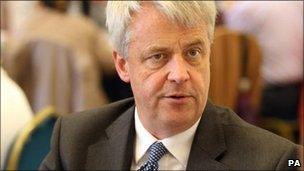NHS health reforms could change - Andrew Lansley
- Published

Health Secretary Andrew Lansley promised he would "never privatise our NHS"
Health Secretary Andrew Lansley has said he is ready to accept "substantial and significant" alterations to plans for changes in the NHS in England.
He told the Daily Telegraph, external there could be changes to the health bill "if they help us improve care for patients".
But Mr Lansley warned the NHS would face "financial crisis within a matter of years" unless it was reformed.
Labour, as well as Lib Dem leader Nick Clegg, have called for the bill to be sent back to MPs for reconsideration.
'Threaten values'
With the government's "listening exercise" on its proposed changes drawing to a close, Mr Lansley said: "We have always been clear that we are ready to accept any changes - substantial and significant - if they help us improve care for patients.
"When the Health and Social Care Bill comes back to Parliament, people should have every confidence that we will make the changes necessary to ensure the NHS is protected for our future generations.
"We will never privatise our NHS.
"But if we choose to ignore the pressures on it, the health service will face a financial crisis within a matter of years that will threaten the very values we hold so dear - of a comprehensive health service, available to all, free at the point of use and based on need and not the ability to pay.
"I will not allow that to happen."
Mr Lansley said reform was necessary in the face of "enormous financial pressures" caused by an ageing population and the rising cost of treatment.
He said the number of people in the UK aged above 85 had almost trebled over the past 25 years and was set to double again over the next 20 years. By 2034, one in 20 of the population would be aged over 85.
As a result the NHS would have to perform two million more operations a year and health spending would double to £230bn, he said.
Mr Lansley said this was a figure the UK "simply cannot afford".
'Disgracefully unethical'
Prime Minister David Cameron has "paused" the legislative progress of the reforms, which aim to hand control of budgets to GPs and increase competition in the NHS.
The move was to allow further consultation on the proposals, a process which came to an end on Tuesday, with the NHS Future Forum, which is overseeing the exercise, expected to report later this month.
The forum brings together doctors, nurses and other health professionals.
Health officials said they had received about 15,000 website responses and 720 letters.
Mr Clegg has said he would oppose the idea of a regulator promoting competition in the health service, a key part of the planned changes.
Confidence vote
The deputy prime minister has indicated that Lib Dem MPs could vote against the bill unless changes are made.
The British Medical Association (BMA) has described a system of incentive payments for GPs known as "Quality Premium", another important part of the reform programme, as "disgracefully unethical".
Dr Laurence Buckman, chairman of the BMA's General Practitioners Committee, said: "We don't understand what the Quality Premium means. We don't understand where it will come from. We rather fear it will come out of our pay and be paid back to us if we do certain things."
In April, delegates at the Royal College of Nursing conference in Liverpool passed a vote of no confidence in the health secretary.
Nurses said they were angry about the changes and the way the government was running the consultation.
'Care passionately'
Mr Lansley said the vision set out by the government would deliver "a truly world-class NHS, with doctors and nurses leading the design of health services, patients taking more control and budgets controlled by locally-accountable people".
"Our health service is facing huge challenges that, if not dealt with today, will almost certainly mean a crisis tomorrow," he said.
"I care passionately about protecting the NHS for the future. This is why doing nothing is not an option. I will not leave the NHS to neglect."
However, for Labour, shadow health secretary John Healey said Mr Lansley was "just adding to confusion and uncertainty in the health service".
"He makes a case for change but not the Tory-led government's top down re-organisation of the NHS," he said.
"As Labour has argued from the outset and as the chorus of criticism during the 'pause' has underlined, these are the wrong reforms for the NHS.
"They are being forced through for reasons of political ideology not improved patient care.
"The huge upheaval of re-organisation is making it harder not easier for the NHS to deal with the financial and efficiency squeeze."